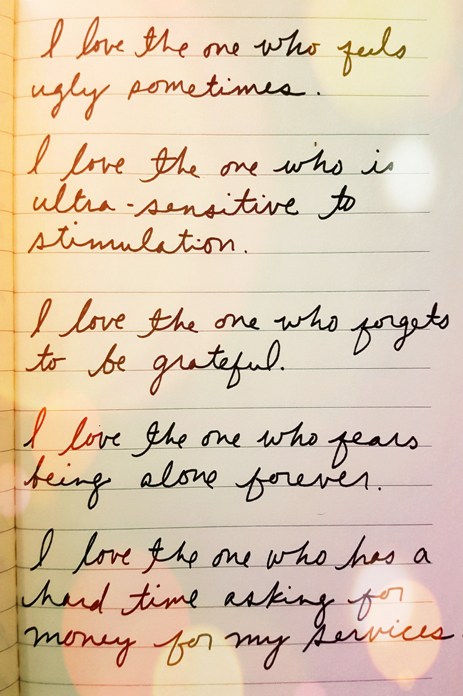Why is it so easy to talk mad smack to ourselves?
To treat ourselves like toilets, garbage disposals, manure piles?
On the one hand, I’ve heard it said that we would never speak to others as unforgivingly as we do to our own selves. And sure, maybe we wouldn’t speak so unkindly to others out loud—though it’s uncanny how the ways in which we dialogue with ourselves translates into how we view and treat others. I’ve noticed that when I’m swimming in pools of self-shame and harsh, unrelenting judgment, it gets cascaded onto others through impatience, mistrust, blame, sarcasm, and withdrawing.
Not cute.
And definitely not the path to manifesting sacred connections and my wildest dreams.
I heard a Dharma talk recently by a wonderful visiting teacher at the Sacramento Buddhist Meditation Group who said, “in Buddhism, we’re not so concerned about the why, we’re much more interested in the how.”
In applying this idea to relentless self-criticism, I’m reminded that it doesn’t really matter why we rip ourselves to shreds in every opportune moment, and it doesn’t matter that we understand exactly where the patterns come from. Because, for one thing, we can never fully understand where everything is sourced. We can spend a whole lot of time and energy psychoanalyzing the love we didn’t rightfully receive as children. We can know that the roots of our self-deprecation are generations and lifetimes deep, and socially and culturally fueled through unjust systems of human exploitation. We can intellectualize all of this, yet still cover up our radiant natures through endless stories of not being smart enough, good-looking enough, strong enough, creative enough, brave enough, supported enough, socially accepted enough, rich enough, energetic enough—enough.
Understanding the why can be helpful in releasing ourselves as the sole cause of all of our problems, but it also puts us in a position to cast blame elsewhere, which ultimately takes away our power to change.
In order to heal and grow out of being locked inside our own masochistic thought patterns and the self-destructive behaviors that follow, we have to take the responsibility back, which means shifting from why to how.
And so instead of asking, why do I have all these issues?
The question becomes, how do I free myself from this suffering?
Here’s a “how” that’s working for me:
For starters, I’m getting super curious about that nasty voice inside my head—how it sounds, what it’s saying, and when it tends to show up. The most obvious route for building this awareness is using my quieting of the mind practices (I tend to be more of a yin yoga and walking meditator), which gives me the opportunity to pay close attention to what’s arising in my thoughts and how these thoughts are expressing themselves in my body.
By setting up regular, quality time for quiet observation of what’s going on upstairs, I’m providing myself access to a much deeper awareness and therefore control in shifting my oppressive mental dialogues into something that is way more aligned with the truth of my higher self.
After becoming more aware of when and how this voice plays itself out, it’s time to get radical on it. Yep, you guessed it—make sweet, sweet love to the shame monster. Love it ’til it tenderizes into something soft and non-threatening.
Here’s where it gets mind blowing:
The parts of us that are so convincing that we are good-for-nothin’ pointless human beings, are the same parts of us that are dying to be seen and heard. They are the parts of us that need to be loved from the sweetest of intentions. And yet the tendency is to get angry, solemn, and frustrated, meeting shame with shame—you know the feeling. I call it the “down to crawl into a hole and die” feeling. Casting shame on the things we don’t feel proud of in the first place is the very response that perpetuates cycles of internal conflict and behavioral suffering.
Here’s the thing I’m really starting to understand: We can’t break unwanted patterns through willful banishment fueled by feelings of never wanting to experience those ugly thoughts and behaviors again. But we can melt them down, softly, and often slowly, through some good ol’ fashion tender-loving-care medicine. It’s the way of the alchemist and the divine mother.
There’s a practice that I learned from one of my favorite spiritual teachers, Matt Kahn, around loving what arises. All of what arises. When we catch that nasty voice doing its nasty thing, he guides us to meet it tenderly, call it what it is, and “love the one who…”
The miraculous thing about naming it is that buried deep down inside each and every one of our shames is the most magical of our powers. For example, my highly sensitive nature that holds me back from enjoying many social functions, experiences, and environments, is the same part of me that provides others with a great sense of calm and ease when sharing space. My sensitivities make manifesting peaceful settings and situations a top priority for my sanity, which can feel shameful and embarrassing when I have to decline invitations to hang out with people I like and care about. But it’s also the part of me that gives me the ability to tune into others on a deep, soul level and be of healing service.
And so…I love the one who is highly sensitive.
Making love to the shame monster isn’t something we do a couple of times and then become all healed up, flying high on the wagon of self-praise and encouraging love talk forever more. It’s something that we practice over and over again. And because the goal is always to shame ourselves less, it’s crucial that we offer ourselves the deepest levels of kindness and forgiveness when we find ourselves back in our old, self-shaming ways. Hating ourselves for for hating ourselves (and I only speak from experience) will only hold us hostage from our true divine power.
I invite you to keep an “I love the one who…” log.
Get those shame monsters up and out and onto the page, cushioned in declarations of your love. It’s most likely going to feel like straight buffoonery, declaring love to the dark and painful parts—and that’s perfectly okay. The point is to get into a habit of offering love medicine to yourself, and witness how your life transforms as a result.

Remember: these logs aren’t for anyone else’s eyes (unless you so choose to share them with your most trusted companions), and so the invitation is to be as real and honest as possible, about anything and everything that feels like shame on your heart.
The healing potential of this practice is profound, and you deserve a clear and spacious heart, mind and body available to receive the most brilliant miracles and manifestations.
“When you make peace with yourself, you make peace with the world.” ~ Maha Ghosananda
Author: Halley Miglietta
Images: Anais Gómez-C/Flickr & Courtesy of the author.
Editor: Catherine Monkman







Read 4 comments and reply